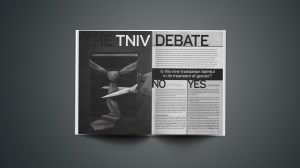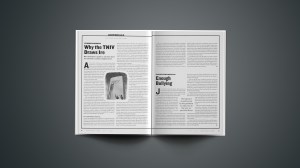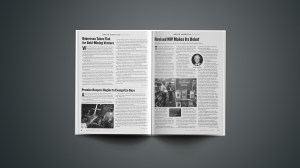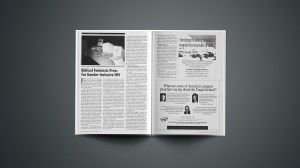In this series

Even to describe the battle over the New International Version: Inclusive Language Version of the Bible (NIVI) is to enter part of the fight. There are too many issues begging for emphasis, too many players to name, and too many outcomes to interpret.
It's clear, however, that one of the most important moments was World magazine's article, "Femme fatale: The feminist seduction of the evangelical church." Appearing in the March 29, 1997, issue of the magazine with the cover tag "The Stealth Bible," the article emphasized procedure. Writer Susan Olasky warned that inclusive language would replace gender-specific pronouns in much of the New International Version (NIV), and that the original version would no longer be available. The NIVI was mentioned, but when Olasky wrote about what the new NIV might look like she used examples from the New Revised Standard Version (see below).
It wasn't until International Bible Society and Zondervan Publishing House complained that World had misrepresented their plans that World issued a specific list of problematic passages in the NIVI. In an April 19, 1997, article, Trinity International University theologian Wayne Grudem (then president of the Council on Biblical Manhood and Womanhood) compared several verses in the NIV and NIVI, giving reasons why he believed the changes compromised Christian theology. "Such revisions are not the words God originally caused to be written, and thus they are not the words of God," he wrote. "They are human words that men have substituted for the words of God, and they have no place in the Bible."
The Committee on Bible Translation (CBT), which translated the NIV, NIVI, and the recently announced Today's New International Version (TNIV) clearly disagrees with Grudem's assessment. "The TNIV uses generic language only where the meaning of the text was intended to include both men and women," the translation's Web site says. "These changes reflect a better understanding of the meaning of the original Greek and Hebrew."
In other words, World magazine and other NIVI opponents believe the changes were made to reflect changing cultural values. The CBT, on the other hand, believes the changes were made because some English words no longer mean what they used to.
The TNIV, therefore, remains closer to the NIVI than the NIV in most of the passages criticized by Grudem's 1997 article. This is especially in cases where gender-specific words were made plural to include both men and women. Below are the New Testament verses Grudem singled out in that article, his summary of why he opposed the change, and how the verses are translated in the TNIV. (The TNIV is currently only available for the New Testament.)
| Luke 17:3 | |
| NIV | If your brother sins, rebuke him, and if he repents, forgive him. |
| NIVI | Rebuke a brother or sister who sins, and if they repent, forgive them. |
| Criticism | "Trying to make they singular impoverishes English by leaving us no clearly plural pronoun; but understanding they as plural mistranslates the singular Greek pronoun autos and corresponding singular verb. (And the lack of agreement in many verses like this creates dissonant English as well.) Jesus could easily have said brother or sister if he had wanted to (see 1 Corinthians 7:15)" |
| TNIV | If any brother or sister sins against you, rebuke the offender; and if they repent, forgive them. |
| John 6:44 | |
| NIV | No one can come to me unless the Father who sent me draws him, and I will raise him up at the last day. |
| NIVI | No one can come to me unless the Father who sent me draws them, and I will raise them up at the last day. |
| Criticism | "Might easily be understood to support the neo-orthodox and Arminian view that God chooses and calls groups of people, not individuals; this is done by mistranslating two singular Greek words. Individual assurance of resurrection is also obscured." |
| TNIV | Same as NIVI |
| John 11:25 | |
| NIV | Jesus said to her, "I am the resurrection and the life. He who believes in me will live, even though he dies." |
| NIVI | Jesus said to her, "I am the resurrection and the life. Those who believe in me will live, even though they die." |
| Criticism | "Forcefulness of promise to individual person is lost. Mistranslates four singular Greek words. (Note that Jesus did not hesitate to use generic he even when speaking to Martha.)" |
| TNIV | Same as NIVI |
| John 14:23 | |
| NIV | If anyone loves me, he will obey my teaching. My Father will love him, and we will come to him and make our home with him. |
| NIVI | Those who love me will obey my teaching. My Father will love them, and we will come to them and make our home with them. |
| Criticism | "Dwelling of Father and Son with individual person is lost; new NIV speaks of Father and Son dwelling among a group of people. Six singular Greek words which John wrote as part of Scripture are mistranslated in this one text." |
| TNIV | Anyone who loves me will obey my teaching. My Father will love them, and we will come to them and make our home with them. |
| Acts 20:30 | |
| NIV | Even from your own number men will arise and distort the truth in order to draw away disciples after them. |
| NIVI | Even from your own number some will arise and distort the truth in order to draw away disciples after them. |
| Criticism | "Obliterates the fact that Paul used a specific Greek noun, andres, to say that the false teachers coming at Ephesus would be men; this word never refers to women, and some is thus a mistranslation." |
| TNIV | Same as NIVI |
| 1 Corinthians 14:28 | |
| NIV | If there is no interpreter, the speaker should keep quiet in the church and speak to himself and God. |
| NIVI | If there is no interpreter, the speakers should keep quiet in the church and speak to themselves and God. |
| Criticism | "Can easily be understood to encourage groups of tongue-speakers to go off together and speak in tongues 'to themselves.' Mistranslates three singular Greek words which Paul wrote." |
| TNIV | If there is no interpreter, the speaker should keep quiet in the church and speak to God when alone. |
| James 1:12 | |
| NIV | Blessed is the man who perseveres under trial, because when he has stood the test, he will receive the crown of life … |
| NIVI | Blessed are those who persevere under trial, because when they have stood the test, they will receive the crown of life … |
| Criticism | "NIV suggests groups of people who endure trial, and reward waits until 'they' all have stood the test. Mistranslates six singular Greek words, including aner, which means man, not person." |
| TNIV | Same as NIVI |
| Revelation 3:20 | |
| NIV | I stand at the door and knock. If anyone hears my voice and opens the door, I will come in and eat with him, and he with me. |
| NIVI | I stand at the door and knock. If anyone hears my voice and opens the door, I will come in and eat with them, and they with me. |
| Criticism | "Idea of Christ coming into an individual person's life is lost; new NIV suggests Christ coming into a church and eating among a group of people. Mistranslates six singular Greek words." |
| TNIV | Same as NIVI |
* * *
Note: Olasky's original article included only one complaint against a New Testament passage in the NRSV, which she called "doctrinally confusing": Hebrews 2:6 (itself a quote of Psalm 8:4). By substituting human beings for man in saying, "What are human beings that you are mindful of them or mortals that you care for them," the passage omits an important messianic reference. "In the book of Hebrews, this passage refers to Christ," Olasky wrote. The three NIV translations treat the verse differently.
| NIV | "What is man that you are mindful of him, the son of man that you care for him?" |
| NIVI | "What is a human being that you are mindful of him, the son of man that you care for him?" |
| TNIV | "What are mere mortals that you are mindful of them, human beings that you care for them?" |
Copyright © 2002 Christianity Today. Click for reprint information.
Related Elsewhere
The TNIV Web site offers the full New Testament text (in Adobe Acrobat format), a questions and answers section, endorsements, and other promotional material. Zondervan is also providing free copies of the translation.
Christianity Today coverage of gender-inclusive Bible translation includes:
Weblog: Southern Baptist Leaders So Upset About TNIV That Denomination May Abandon NIV (Jan. 29, 2002)
Revised NIV Makes Its Debut | Translators alter 7 percent of the text to update style and gender issues. (Jan. 28, 2002)
The Battle for the Inclusive Bible | Conflicts over "gender-neutral" versions are not really about translation issues. (Nov. 15, 1999)
Do Inclusive-Language Bibles Distort Scripture? | He Said, They Said (October 27, 1997)
The Great Translation Debate | The divide over gender-inclusive Bibles hides what unites us. (Oct. 27, 1997)
Hands Off My NIV! | Bible society cancels plans for 'gender-accurate' Bible after public outcry. (June 16, 1997)
Bible Translators Deny Gender Agenda | Focus on the Family yanks children's Bible; NIV translator loses seminary job. (July 14, 1997)
The Council for Biblical Manhood and Womanhood is also criticizing the TNIV.
Expect World magazine to respond to the TNIV in its next issue, which will be posted online Friday.















